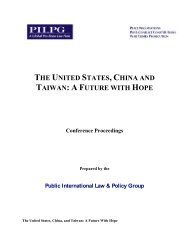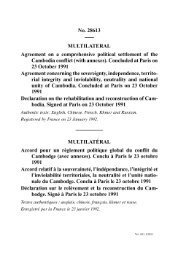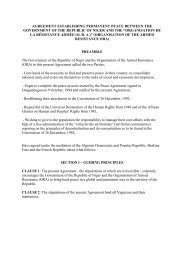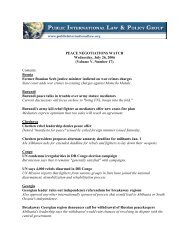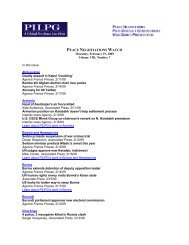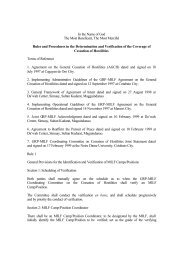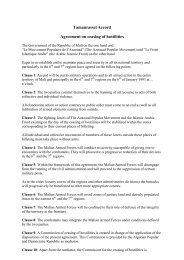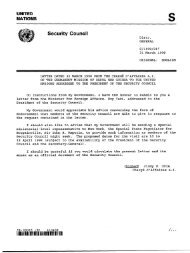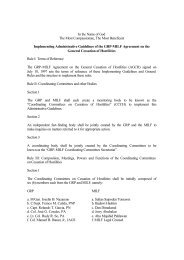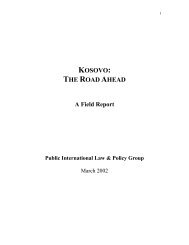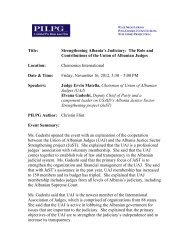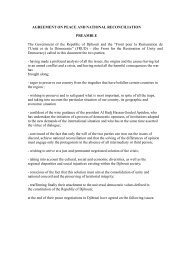Kosovo Albanian Delegation Negotiation Briefing Packet
Kosovo Albanian Delegation Negotiation Briefing Packet
Kosovo Albanian Delegation Negotiation Briefing Packet
You also want an ePaper? Increase the reach of your titles
YUMPU automatically turns print PDFs into web optimized ePapers that Google loves.
16<br />
• International agreement on the principle of reparations and on a specific figure for<br />
what Belgrade owes <strong>Kosovo</strong> <strong>Albanian</strong>s for actions beginning with the forcible<br />
suppression of <strong>Kosovo</strong>'s autonomy in 1989.<br />
• Agreement that <strong>Kosovo</strong> should get a specific share of the assets of the SFRY.<br />
Acceptable Minimums:<br />
• Full local control over economic assets in areas controlled by Pristina.<br />
• Technical economic cooperation with Belgrade where necessary, e.g. electricity.<br />
• Any ties with EU do not go through Belgrade.<br />
• Shared administration of Trepca with Belgrade, under international authority.<br />
Background<br />
The <strong>Kosovo</strong> economy hardly exists above the level of restaurants, food stores and other<br />
small businesses in the service sector. According to UN data <strong>Kosovo</strong> is desperately poor,<br />
with per capita GDP between $850 and $950. Even though official data certainly miss a<br />
considerable amount of the money which flows into <strong>Kosovo</strong> from workers abroad and<br />
other sources, the basic picture remains one of poverty, unemployment, high birth rate,<br />
and absence of local opportunity. With economic support from international and<br />
diaspora sources declining, many Kosovars are beginning to worry about signs of<br />
downturn in the small business economy which up to now has lent a surface air of<br />
vibrancy to Pristina and other cities in <strong>Kosovo</strong>.<br />
<strong>Kosovo</strong>’s grim economic realities have been compounded by UNMIK’s economic<br />
mismanagement, including a policy on customs and taxation which favors imports and<br />
makes any investment in local productive capacity very difficult. Privatization was<br />
delayed for years and its initial implementation has been accompanied by charges of<br />
incompetence and corruption. Absence of clarity about final status and severe power<br />
shortages which continue to persist four years after the end of the war have all but<br />
precluded significant large-scale foreign investment and seem likely to continue to do so<br />
through the foreseeable future.<br />
<strong>Kosovo</strong> <strong>Albanian</strong>s will insist on their right to conduct all economic activities, whether<br />
governmental or private, independently of Serbia. They will seek a direct relationship<br />
with the EU but be prepared to forego any relationship if Brussels insists it must go<br />
through Belgrade. But <strong>Kosovo</strong> <strong>Albanian</strong> leaders seem to have given little serious thought<br />
to economic aspects of final status negotiations. Most <strong>Albanian</strong> political leaders still<br />
seem to expect that <strong>Kosovo</strong>’s economic future will be linked to the former the Socialist<br />
enterprises that led the <strong>Kosovo</strong> economy before 1989—which even then survived thanks<br />
only to heavy subsidies from the rest of Yugoslavia. They also view the economy as a<br />
field of political patronage and influence which has led them to try to retain the remnants<br />
of the Socialist enterprises and inhibits individual entrepreneurs.<br />
<strong>Kosovo</strong> <strong>Albanian</strong>s will insist that the legally constituted authorities in Pristina should<br />
have full control over the Trepca complex, either to prepare for privatization or to run it.



